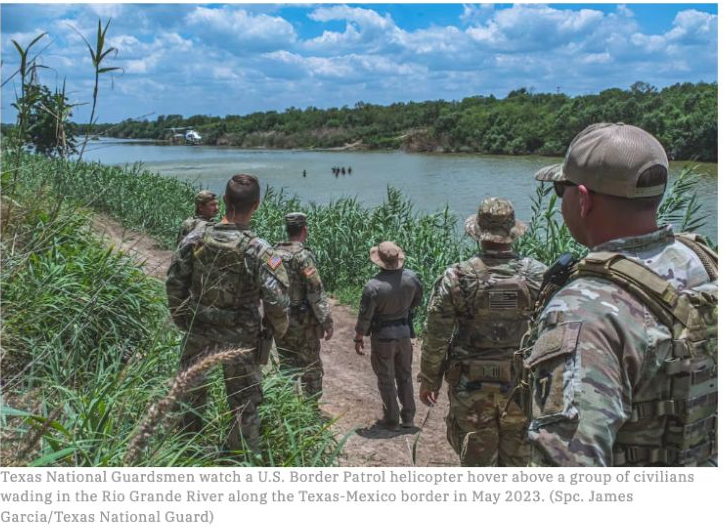This article appears in the Spring 2025 edition of Combat Stress Magazine.
By Miguel Ruiz, Marketing Strategy Director
In an election year, various public interest and political topics and rhetoric arise in droves. Turn on any station, click any story, and you’re sure to be flooded with various narratives that all seem designed to pit you against another side. One of those persistent issues is the state of the U.S. southern border. For the past several years, the media has brought constant news from that region. But here’s the thing: seldom do you hear stories from the level of the people working at the border. Nowadays, independent journalism and social media platforms have helped surface some of these stories, but most major news outlets still don’t cover the ground-level experiences. Instead, they may emphasize rhetoric and talking points.
The fact is that multiple governmental and local agencies partner together 24/7 to combat the everyday challenges along the southern border. I won’t get into the broader issues themselves because that’s for another platform and deserves a much more detailed explanation. But instead, I want to shine a light on the people working the border. You’ve got dozens of sheriff’s departments, police departments, state entities, federal entities, and then you also have the Texas Military Department — specifically, the Texas Army National Guard. I was one of those Texas Army National Guard troops, part of the first Texas boots on the ground in the currently ongoing Operation Lone Star, the Texas-backed mission to deploy Soldiers and state troopers to support overwhelmed local agencies along Texas border cities.
For National Guardsmen, deployment can be wildly unpredictable, unlike active-duty military personnel who often have months of notice and lead-up training before deployment. Statewide deployments for Guardsmen typically come at the last minute, following orders directly from the governor. In my first year as a Guardsman, I was working full-time in a sales office in Fort Worth, a regular post-college gig. One day, I got a call at my sales desk from my unit commander telling me I was deploying that night and needed to pack my gear immediately to commute to a Guard airfield hours away. This was to participate in 24-hour flood rescue operations in the Rio Grande Valley for an uncertain period of time. Thankfully, my employer was Guard-friendly and understood my obligations, but this abrupt change of routine was something I would grow accustomed to over the next six years. As my life evolved, so did the stakes — what started as manageable disruptions when I was single turned into much greater challenges as I started a family, including numerous sudden activations for stateside disasters and then Operation Lone Star.
For me, that deployment happened less than two years ago. I served as a 46S, a Public Affairs Mass Communication Specialist, in charge of other Public Affairs Soldiers and responsible for setting up journalism operations along the entire border. I had a unique backstage view into everything — from planning operations, logistical movements, and intelligence, to being on the ground, rolling around with first responder agencies in my own sanctioned vehicles, and participating in various, and uniquely dangerous, operations.
What makes deployments for Texas Army National Guard Soldiers unique is that most of them, myself included, have full-time civilian careers back home. Most National Guard troops receive abrupt orders to deploy in response to natural disasters, civil unrest, or in this case, Operation Lone Star — an unprecedented activation of state Soldiers and law enforcement officers, with political implications and controversies.
The financial and logistical challenges associated with Operation Lone Star became a significant point of controversy, drawing public criticism and political debate. As a public affairs non-commissioned officer (NCO), I was tasked with coordinating my small unit of Soldiers, scattered across the border, ensuring their pay, lodging, responsibilities, and personal affairs were handled. But just weeks into our sudden deployment, several of my Soldiers went without pay for months. One had a mortgage and child support to manage, dipping into savings multiple times to stay afloat. Another Soldier I overheard in line at the headquarters pay office was pleading for immediate pay, explaining how his wife was a stay-at-home mom, and they had missed bills, creating a dire financial situation. It was a morale killer for many of the troops, especially when such a basic need like pay wasn’t met, creating immense stress not just for the Soldiers but also their families.
Stress was rampant throughout the operation, for both the National Guard and other first responders. While I could handle the physical and emotional toll as part of the job, it was the prolonged uncertainty that really wore me down. My original orders were for a four-month deployment, but as time passed, those orders extended — first to eight months, then 12, and eventually, there was no clear end in sight. For someone like me, who had a family at home and a baby on the way, this uncertainty became an additional source of stress. How do you tell your family or civilian employer when you’re coming home when you don’t even know yourself? I had that conversation with my spouse and family over and over: “I don’t know when I’m coming home.”
The stress I experienced during my time in the National Guard was expected in many ways — I signed up knowing military operations, whether local or global, came with challenges. But there were things you don’t anticipate, like the loss of close friends and colleagues in various missions, or the prolonged uncertainty and separation from family during back-to-back deployments. These experiences deeply affected me, my fellow Soldiers, and our families. Now, as I’ve transitioned to full-time civilian life and a career in marketing, I realize how much those past stressors prepared me. Today, I find myself able to handle high-pressure situations with a certain calmness — or perhaps a numbness. Whether that’s a good thing or not, I’m still unsure, but at least it taught me resilience and an ability to multitask and endure challenges in both my personal and professional life.
Despite all this, we carried on and completed our portions of the mission, even in the face of deadly working conditions during some of the operations. The irony is, while Soldiers and first responders were dealing with these immense challenges, much of the media focused on political controversies or big headlines. Rarely did anyone speak about the toll on the ground level — on the Soldiers, law enforcement, or even the migrants facing life-changing stress, with families torn apart and lives lost at the border.
In the end, I simply want to shed some light on the brave first responders and Texas Guardsmen who continue to serve along the southern border, away from their families, in extremely difficult conditions. The next time you hear someone repeat political talking points, I hope you also think about the human side — the men and women who serve every day, often unseen, under immense stress.
Miguel Ruiz is a marketing and advertising professional with over 12 years of experience, leading marketing for clients across Texas and around the globe. A former Public Affairs Mass Communications Specialist in the Texas Army National Guard, Miguel documented multiple overseas deployments, humanitarian missions, and stateside operations. Beyond his professional endeavors, he serves on nonprofit boards in Fort Worth, mentors rising marketing professionals, and provides pro bono training for local small business owners. Named one of Fort Worth Inc.’s “40 Under 40,” Miguel is currently pursuing a Master of Science degree at Texas A&M University. He can be reached at [email protected].





